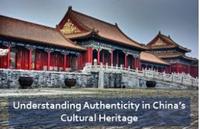
Notions of “authenticity” are both culturally constructed and historically contingent. What one deems to be genuine or fake follows norms agreed upon by their particular communities. In this network, we discuss the construction “authenticity,” and its consequences, in relation to China’s cultural heritage - those objects, texts, and intangible practices concerned with China’s past. Questions to consider include, but are not limited to: How do standards for authenticity change in time, space, and between various object- or text-types, and why? Who arbitrates what counts as authentic, and from where does that authority stem? Who made forgeries, how did they circulate, and what was their economic effect? How has forgery been used to contest ownership of the past, to enact political protest, or push intellectual programs? How do current anxieties over authenticity impact the management of China’s cultural heritage today? We would like to emphasize that we are *NOT* interested in methodologies for authentication per se, or adjudicating whether or not specific objects or texts ought to be regarded as genuine or fake, but rather in the cultural, social, economic, and political construction of authenticity.
The term card for these talks taking place in Hilary Term 2022 is here:
We will be hosting an online conference 16-20 March, 2021. For further information and to register please click here.
You can now watch the recordings of the following discussions by clicking on the links below:
Zhang Lisheng and David Francis (UCL) discussed "Reevaluating authenticity: Creativity in contemporary craft making in China"
David Lebovitz (HKBU Jao Tsung-I Academy of Sinology) "Was it really so, royal uncles? Notions of authenticity in the reception, redaction and reconstruction of some avuncular remonstrations"
Stephanie Su, Assistant Professor of Asian Art, University of Colorado, Boulder "Making Forgeries, Making Canons: Chinese Art Historical Writing in the Early 20th Century"
Penny Dan Xu (Vrije Universiteit Brussel): Copy, yet Original: Re-examining ‘fang Ni Zan’ paintings in the 15th - 17th centuries
Guo Boya (Harvard University):Critical Chinese Copying as an Interrogation of the Hegemony of Modernity
Visit the TORCH website here for further details.
**“Understanding Authenticity in China’s Cultural Heritage” is generously sponsored by Oxford University’s Knowledge Exchange Seed Fund, TORCH Heritage Seed Fund, The British Academy, The Leverhulme Trust, Oxford China Centre, St. Hugh’s College, and Pembroke College.**